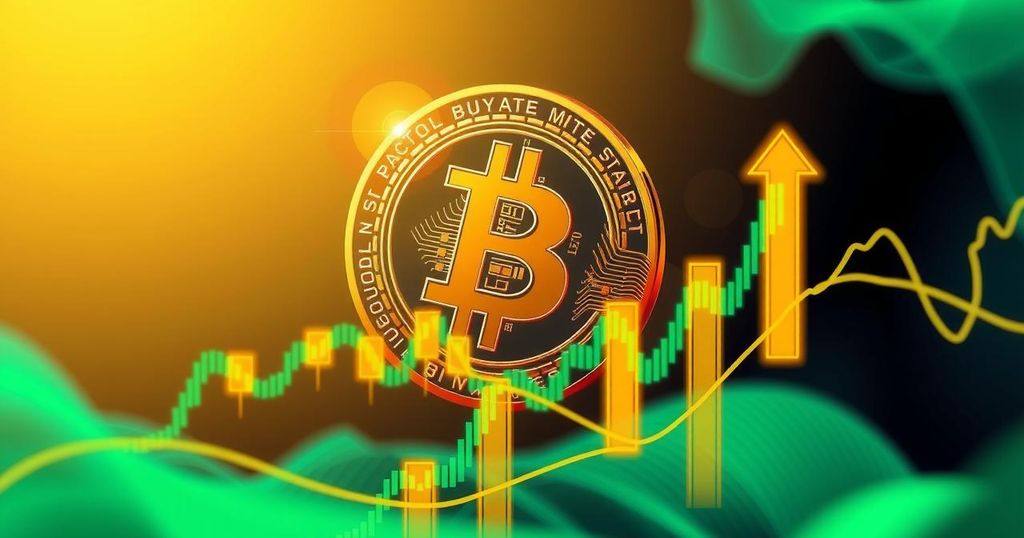US Economic Contraction: Bitcoin Could Benefit Amidst Recession Fears
The U.S. economy contracted by 0.3% in Q1, raising recession fears. This has led to increased expectations for Federal Reserve interest rate cuts, which crypto analyst André Dragosch claims may benefit Bitcoin. While Bitcoin fell slightly to around $94,000, the cryptocurrency could thrive amid economic uncertainty, as it operates independently of traditional market pressures, unlike stocks.
In a surprising twist, the U.S. economy reported a contraction of 0.3% in the first quarter, which has had immediate repercussions for investors. While Bitcoin experienced a slight dip, the overall sentiment among analysts sees the potential for the cryptocurrency market to thrive amid these economic changes. One voice calling attention to this trend is André Dragosch, head of research at Bitwise, who suggests that recession fears might actually bolster Bitcoin’s position.
Dragosch explained that the growing likelihood of a U.S. recession — defined as two consecutive quarters of shrinking GDP — is raising expectations for interest rate cuts by the Federal Reserve. The once-dominant U.S. Dollar appears to be in decline, leading to what could be a positive shift for Bitcoin as traders start to pivot their focus. “I think the bull market continues,” Dragosch noted, referring to how initial bearish sentiments are morphing into optimism for the cryptocurrency.
Currently, Bitcoin’s value is hovering around the $94,000 mark, reflecting a 1% decrease over the last day. Following the economic release, the price briefly dipped to $93,300, mirroring a downward trend seen in many altcoins. The market is responding to both recession concerns and the potential for significant changes in interest rates, which could catalyse a rally in risk assets, including Bitcoin.
Reflecting back to February when President Donald Trump initiated a shift in global trade policies, investor sentiment turned cautious due to tariff risks. At that point, there were outflows from Bitcoin exchange-traded funds (ETFs) and a notable market downturn. Investors were worried that these policies would pressure the Fed to maintain higher interest rates longer, which would constrict economic momentum.
As of Wednesday, traders have become more confident that the Fed could cut its benchmark interest rate to between 3.75% and 4% by the end of its July meeting. This represents a growing consensus, with a shift in probability from 52% to 58% of such a reduction occurring. Lower interest rates typically favour riskier investments, which includes both equities and cryptocurrencies due to lower borrowing costs and increased market liquidity.
However, Dragosch pointed out a critical difference: while a recession could hinder companies’ revenue, Bitcoin functions independently of traditional market constraints. “It’s an asset that’s disconnected from the system,” he stated, emphasising that systemic risks are less impactful on Bitcoin compared to equities.
The correlation between Bitcoin and traditional stock markets appears to be weakening, as the cryptocurrency has rallied alongside gold in recent weeks. This shift can be interpreted as part of a broader trend away from dollar reliance, a phenomenon known as de-dollarization. Investors are reevaluating risks tied to dollar-dominated assets amidst ongoing economic volatility.
Interestingly, during periods of strong U.S. growth or economic downturn, the dollar tends to either rise or fall, respectively. This behaviour is often referred to as the dollar smile theory. Dragosch illustrated this concept, stating that when U.S. growth is lacklustre in comparison to global peers, the dollar usually weakens.
As of Wednesday, the U.S. Dollar Index (DXY) climbed by 0.23%, although it’s flat for the last month and down by 8.3% for the year. “Bitcoin tends to have a high inverse sensitivity to the dollar,” Dragosch remarked, suggesting that if a structural depreciation of the dollar is anticipated, Bitcoin may present an attractive hedge for investors navigating these uncertain waters.




Post Comment